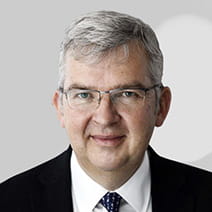Global equity markets have been dominated by US mega caps for what is now approaching two years. The substantial share price rises of Nvidia, Alphabet, Microsoft, Meta and Amazon – five of the so-called Magnificent 7 – over this period have been driven primarily by the relentless excitement around AI. These five companies accounted for 50% of the return of the 500 largest listed companies in the US in 2023.
This AI frenzy continued into the second quarter of 2024, with Nvidia for example rising by 36.6% in sterling terms and Apple increasing by 22.8%. These share price movements have led to stock market concentration, both in the US and globally, reaching an all-time extreme level. This poses two potential risks to investors.
First, active investors cannot go overweight companies with such huge weightings in the index because of restrictions on individual stock holdings. In contrast, passive investors do allocate according to market capitalisations.
But, equally, if sentiment turns against these mega caps, perhaps because they are unable to continually meet or outperform earnings expectations, then their share prices may start moving downwards. In this scenario, investors will benefit from a diversified portfolio that active managers can help to provide, particularly through exposure to small and mid cap equities, bonds and alternatives.
This concentration risk comes at a time when flows into passives have been rapidly growing. It has been reported by NextWealth that the percentage of assets in passive investments within Discretionary MPS has risen from 29% to 43% over the past two years. According to RiF, 39% of advisers’ client assets are now being invested passively compared to 26% in the second quarter of 2021.
It is important to be aware of the exposure of client portfolios to the mega caps and the associated risks. While we are not predicting the timing of any market rotation, there were signs of one in July with a fall in the share prices of the Magnificent 7 and a commensurate gain in other parts of the market, most notably smaller companies.
The share prices of the Magnificent 7 stocks dropped by 7% or 8% over the two weeks to 19 July in sterling terms while the US Smaller Companies Index rose by a similar amount, which had its best week for a few years. Elsewhere in the US, stocks were still performing well, even the large caps. The S&P 500, therefore, continued to rise despite the headwinds provided by Magnificent 7 underperformance, with the other 493 stocks doing the heavy lifting.
What drove this rotation? Ultimately, it boils down to sentiment, but there has to be something behind this, which on this occasion may be that inflation is under control, the US economy remains in pretty good shape, and we are seeing earnings and profitability be delivered across the index not just among the mega caps. The interesting balancing act is that there is a market expectation of more cuts in rates than have been signalled by Jay Powell, Chair of the US Federal Reserve, while the economy may be strong enough not to require this extra cut.
We have also been seeing plenty of rotation in politics, with Joe Biden withdrawing from the US presidential election, a move away from the middle ground in parts of Europe and the Labour Party winning a landslide majority of seats in the General Election. This now means that the UK has become a relative haven of political stability after nearly a decade of uncertainty. This reinforces our confidence about the UK stock market, which has been driven by valuations and the potential for capital flows. Among the other equity markets we are bullish about are Asia ex-Japan, emerging markets, Japan and US small caps.
We have also seen a number of interesting changes in fixed income. We presently consider global government bonds, including gilts, to be a 3 out of 5 on our tactical asset allocation, with 5 being the most bullish. This is because, as yields have drifted up, government bonds have been afforded the opportunity to perform their classical role in portfolio construction – namely, to provide income and as a portfolio diversifier.
Income from government bonds is now at a healthy level having sat at rock bottom rates following the Global Financial Crisis (GFC) more than decade ago. With 10 year gilts yielding 4.1%, US Treasuries 4.3% and German bunds 2.6%, there is a good near term prospect of generating income in excess of inflation. And as a result of these higher yields, there is scope for them to compress again during periods of market stress and thus for government bonds to rise in price. A final advantage of these running yields is that investors make income by standing still.
We believe the key lesson from all these market, economic and political developments is that diversifying client portfolios, patient investing for the long term and a consistent investment process are more important than ever. There are no signs of the potential for rotations ending any time soon.
KEY RISKS
Past performance is not a guide to future performance. The value of an investment and the income generated from it can fall as well as rise and is not guaranteed. You may get back less than you originally invested.
The issue of units/shares in Liontrust Funds may be subject to an initial charge, which will have an impact on the realisable value of the investment, particularly in the short term. Investments should always be considered as long term.
The Funds and Model Portfolios managed by the Multi-Asset Team may be exposed to the following risks:
Credit Risk: There is a risk that an investment will fail to make required payments and this may reduce the income paid to the fund, or its capital value. The creditworthiness of a bond issuer may also affect that bond's value. Bonds that produce a higher level of income usually also carry greater risk as such bond issuers may have difficulty in paying their debts. The value of a bond would be significantly affected if the issuer either refused to pay or was unable to pay; Counterparty Risk: The insolvency of any institutions providing services such as safekeeping of assets or acting as counterparty to derivatives or other instruments, may expose the Fund to financial loss; Liquidity Risk: If underlying funds suspend or defer the payment of redemption proceeds, the Fund's ability to meet redemption requests may also be affected; Interest Rate Risk: Fluctuations in interest rates may affect the value of the Fund and your investment. Bonds are affected by changes in interest rates and their value and the income they generate can rise or fall as a result; Derivatives Risk: Some of the underlying funds may invest in derivatives, which can, in some circumstances, create wider fluctuations in their prices over time; Emerging Markets: The Fund may invest in less economically developed markets (emerging markets) which can involve greater risks than well developed economies; Currency Risk: The Fund invests in overseas markets and the value of the Fund may fall or rise as a result of changes in exchange rates. Index Tracking Risk: The performance of any passive funds used may not exactly track that of their Indices. Any performance shown in respect of the Model Portfolios are periodically restructured and/or rebalanced. Actual returns may vary from the model returns.
The risks detailed above are reflective of the full range of Funds managed by the Multi-Asset Team and not all of the risks listed are applicable to each individual Fund. For the risks associated with an individual Fund, please refer to its Key Investor Information Document (KIID)/PRIIP KID.
DISCLAIMER
This is a marketing communication. Before making an investment, you should read the relevant Prospectus and the Key Investor Information Document (KIID), which provide full product details including investment charges and risks. These documents can be obtained, free of charge, from www.liontrust.co.uk or direct from Liontrust. Always research your own investments. If you are not a professional investor please consult a regulated financial adviser regarding the suitability of such an investment for you and your personal circumstances.
This should not be construed as advice for investment in any product or security mentioned, an offer to buy or sell units/shares of Funds mentioned, or a solicitation to purchase securities in any company or investment product. Examples of stocks are provided for general information only to demonstrate our investment philosophy. The investment being promoted is for units in a fund, not directly in the underlying assets. It contains information and analysis that is believed to be accurate at the time of publication, but is subject to change without notice. Whilst care has been taken in compiling the content of this document, no representation or warranty, express or implied, is made by Liontrust as to its accuracy or completeness, including for external sources (which may have been used) which have not been verified. It should not be copied, forwarded, reproduced, divulged or otherwise distributed in any form whether by way of fax, email, oral or otherwise, in whole or in part without the express and prior written consent of Liontrust.








